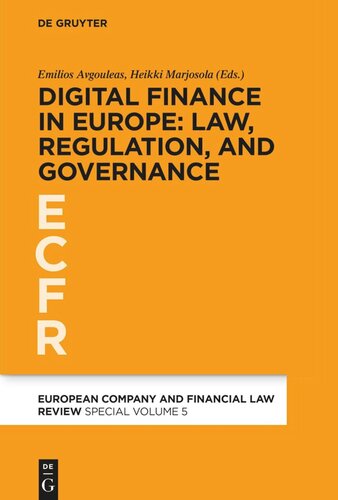

Most ebook files are in PDF format, so you can easily read them using various software such as Foxit Reader or directly on the Google Chrome browser.
Some ebook files are released by publishers in other formats such as .awz, .mobi, .epub, .fb2, etc. You may need to install specific software to read these formats on mobile/PC, such as Calibre.
Please read the tutorial at this link: https://ebookbell.com/faq
We offer FREE conversion to the popular formats you request; however, this may take some time. Therefore, right after payment, please email us, and we will try to provide the service as quickly as possible.
For some exceptional file formats or broken links (if any), please refrain from opening any disputes. Instead, email us first, and we will try to assist within a maximum of 6 hours.
EbookBell Team

4.1
90 reviewsGlobal finance is in the middle of a radical transformation fueled by innovative financial technologies. The coronavirus pandemic has accelerated the digitization of retail financial services in Europe. Institutional interest and digital asset markets are also growing blurring the boundaries between the token economy and traditional finance. Blockchain, AI, quantum computing and decentralised finance (DeFI) are setting the stage for a global battle of business models and philosophies. The post-Brexit EU cannot afford to ignore the promise of digital finance. But the Union is struggling to keep pace with global innovation hubs, particularly when it comes to experimenting with new digital forms of capital raising. Calibrating the EU digital finance strategy is a balancing act that requires a deep understanding of the factors driving the transformation, be they legal, cultural, political or economic, as well as their many implications. The same FinTech inventions that use AI, machine learning and big data to facilitate access to credit may also establish invisible barriers that further social, racial and religious exclusion. The way digital finance actors source, use, and record information presents countless consumer protection concerns. The EU’s strategic response has been years in the making and, finally, in September 2020 the Commission released a Digital Finance Package. This special issue collects contributions from leading scholars who scrutinize the challenges digital finance presents for the EU internal market and financial market regulation from multiple public policy perspectives. Author contributions adopt a critical yet constructive and solutions-oriented approach. They aim to provide policy-relevant research and ideas shedding light on the complexities of the digital finance promise. They also offer solid proposals for reform of EU financial services law.